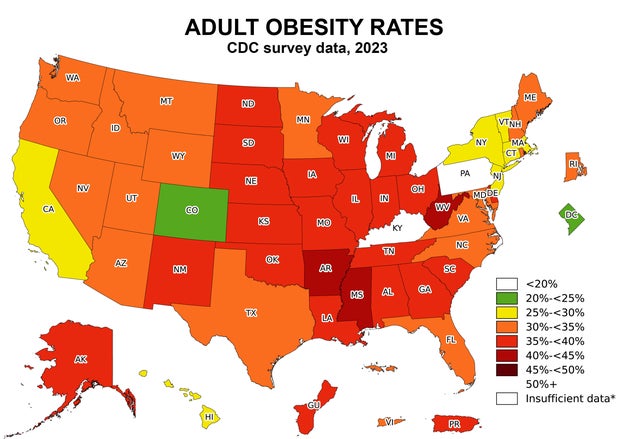CBS News
Obesity rate in U.S. adults no longer growing, new CDC data suggests

Around 40% of adults in the U.S. are obese, new data from the Centers for Disease Control and Prevention suggests — marking the first time in over a decade that the nation’s obesity rate has not inched up in results from the federal government’s national health survey.
The figures come from a new report by the CDC’s National Center for Health Statistics, analyzing data collected through the agency’s decadeslong National Health and Nutrition Examination Survey nationwide.
In 2000, the survey estimated that around 30% of adults were obese, defined as having a body mass index of greater than or equal to 30. By 2020, the CDC’s estimate of the adult obesity rate had climbed to 41.9%.
Now the CDC estimates that 40.3% of adults are obese, looking at survey data from 2021 through 2023.
While the difference from 2020 to 2023 was too small to be counted as a statistically significant decrease, the modest decline breaks a streak of rates that had been increasing virtually every year since 2011.
“In the United States, the prevalence of obesity in adults remains above the Healthy People 2030 goal of 36.0%,” the agency said in the report, citing the federal government’s official goal to reduce the share of Americans who are overweight or obese.
Obesity rates remain highest among adults 40 to 59 years old, at 46.4%. Rates are lowest among those 20 to 39 years old, at 35.5%.
Severe obesity rates continue to increase, the CDC’s survey also found. Adjusted for age, the prevalence of adults with a BMI of greater than or equal to 40 increased from 7.7% to 9.4%.
At these higher ranges of obesity, the National Institutes of Health warns that people are at the greatest risk of the diseases that are linked with weight gain, like heart disease and diabetes.
Map shows states with highest, lowest obesity rates
The new figures come just a week after the CDC released its state map of obesity rates around the country, based on results from a different ongoing survey run by the agency, which found that more than a third of adults in 23 states were obese in 2023. That is up from no states with more than a third of residents being obese a decade ago in 2013.
Only the District of Columbia and Colorado had less than a quarter of residents who were obese in 2023. That’s down from seven states and D.C. that had rates below 25% in 2013.
U.S. Centers for Disease Control and Prevention
“This new data highlight the need for obesity prevention and treatment options, which start with building healthier communities where people of all ages have safe places for physical activity, and where health care and healthy food options are accessible and affordable for all,” Dr. Karen Hacker, head of the CDC’s National Center for Chronic Disease Prevention and Health Promotion, said in a statement following the map’s release.
The release of the new CDC figures also comes ahead of a Senate Health, Education, Labor and Pensions committee hearing with the chief executive officer of Novo Nordisk, questioning the drugmaker for the high prices it charges for its blockbuster semaglutide drugs, branded as Ozempic for diabetes and Wegovy for weight loss.
A surge of demand for Novo Nordisk’s drugs, as well as similar tirzepatide drugs made by rival Eli Lilly branded as Zepbound for weight loss and Mounjaro for diabetes, have landed them on the Food and Drug Administration’s shortage list for years.
“Epidemiologists have estimated that more than 40,000 lives per year could be saved if Wegovy and other weight-loss drugs were made affordable and widely available in the United States,” the panel, led by Democrats and Vermont Independent Senator Bernie Sanders, said in a release ahead of the hearing.
CBS News
Texas man executed for killing infant son after waiving right to appeal death sentence

HUNTSVILLE — A Texas man who had waived his right to appeal his death sentence was put to death Tuesday evening for killing his 3-month-old son more than 16 years ago, one of five executions scheduled within a week’s time in the U.S.
AP
Travis Mullis, 38, received a lethal injection at the state penitentiary in Huntsville and was pronounced dead at 7:01 p.m. CDT. He was condemned for stomping to death his son Alijah in January 2008.
Mullis was the fourth inmate put to death this year in Texas, the nation’s busiest capital punishment state. Another execution was carried out Tuesday evening in Missouri, and on Thursday, executions were scheduled to take place in Oklahoma and Alabama. South Carolina conducted an execution Friday.
Authorities said Mullis, then 21 and living in Brazoria County, drove to nearby Galveston with his son after fighting with his girlfriend. Mullis parked his car and sexually assaulted his son. After the infant began to cry uncontrollably, Mullis began strangling the child before taking him out of the car and stomping on his head, according to authorities.
The infant’s body was later found on the roadside. Mullis fled the state but was later arrested after surrendering to police in Philadelphia.
Mullis’ execution proceeded after one of his attorneys, Shawn Nolan, said he planned no late appeals in a bid to spare the inmate’s life. Nolan also said in a statement Tuesday afternoon that Texas would be executing a “redeemed man” who has always accepted responsibility for committing “an awful crime.”
“He never had a chance at life being abandoned by his parents and then severely abused by his adoptive father starting at age three. During his decade and a half on death row, he spent countless hours working on his redemption. And he achieved it. The Travis that Texas wanted to kill is long gone. Rest in Peace TJ,” Nolan said.
Mullis declined an offer earlier in the day to phone his attorney from a holding cell outside the death chamber, said Texas Department of Criminal Justice spokeswoman Hannah Haney. His lawyers also did not file a clemency petition with the Texas Board of Pardons and Paroles.
In a letter submitted in February to U.S. District Judge George Hanks in Houston, Mullis wrote that he had no desire to challenge his case any further. Mullis has previously taken responsibility for his son’s death and has said “his punishment fit the crime.”
At Mullis’ trial, prosecutors said Mullis was a “monster” who manipulated people, was deceitful and refused the medical and psychiatric help he had been offered.
Since his conviction in 2011, Mullis has long been at odds with his various attorneys over whether to appeal his case. At times, Mullis had asked that his appeals be waived, only to later change his mind.
Nolan had previously told the 5th U.S. Circuit Court of Appeals during a June 2023 hearing that state courts in Texas had erred in ruling that Mullis had been mentally competent when he had waived his right to appeal his case about a decade earlier.
Nolan told the appeals court that Mullis has been treated for “profound mental illness” since he was 3 years old, was sexually abused as a child and is “severely bipolar,” leading him to change his mind about appealing.
Natalie Thompson, who at the time was with the Texas Attorney General’s Office, told the appeals court that Mullis understood what he was doing and could go against his lawyers’ advice “even if he’s suffering from mental illness.”
The appeals court upheld Hank’s ruling from 2021 that found Mullis “repeatedly competently chose to waive review” of his death sentence.
The U.S. Supreme Court has prohibited the application of the death penalty for the intellectually disabled, but not for people with serious mental illness.
If the remaining executions in Texas, Alabama and Oklahoma are carried out as planned, it will mark the first time in more than 20 years — since July 2003 — that five were held in seven days, according to the nonprofit Death Penalty Information Center, which takes no position on capital punishment but has criticized the way states carry out executions.
The first took place Friday when South Carolina put inmate Freddie Owens to death. Also Tuesday, Marcellus Williams was executed in Missouri. On Thursday, executions are scheduled for Alan Miller in Alabama and Emmanuel Littlejohn in Oklahoma.
CBS News
9/24: CBS Evening News – CBS News

Watch CBS News
Be the first to know
Get browser notifications for breaking news, live events, and exclusive reporting.
CBS News
9/24: The Daily Report with John Dickerson

Watch CBS News
Be the first to know
Get browser notifications for breaking news, live events, and exclusive reporting.










